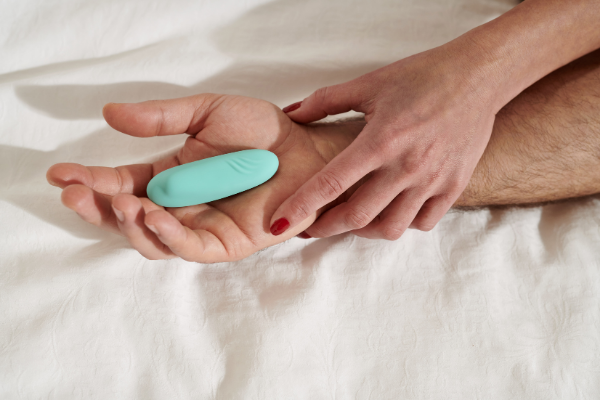5 Common Myths About Masturbation

May is National Masturbation Month, which was created to mark the unjust 1995 firing of US Surgeon General Joycelyn Elders, who publicly said that masturbation is a natural part of human sexuality and something that should perhaps be discussed in sex education courses. Elders’ comments were extremely controversial at the time and ultimately led to her dismissal.
Her comments were controversial, in part, because masturbation and its effects are widely misunderstood. To this day, many people still view masturbation as bad for our health and relationships. So, let’s clear up some popular myths about self-pleasure once and for all. In this article, I will explore five common myths about masturbation and explain what the science actually says.
Myth #1: Masturbation is bad for your health.
When it comes to the supposed negative health effects of masturbation, I’ve heard it all. Some have argued that touching yourself and touching yourself frequently can cause everything from erectile dysfunction to infertility to blindness to insanity. While some of those things might sound really outlandish, it’s worth mentioning that, in the not too distant past, a lot of prominent physicians warned about the dangers of masturbation and even promoted radical “cures” for it, including anti-masturbation devices (like chastity cages), libido-depressing diets, and even medical procedures designed to reduce genital sensation.
When you consider that people in the medical profession were saying this for centuries, it’s not surprising that masturbation still has so much baggage attached to it today.
However, the truth of the matter is that masturbation is typically linked to positive-not negative-health effects, both physically and psychologically. For example, studies have linked masturbation to positive physical health outcomes, including stimulation of the immune system (which could potentially help your body to fight off infections) and, among men, a lower risk of prostate cancer.
Psychologically, research has linked masturbation to temporary relief from stress and pain, as well as higher levels of self-esteem.
Granted, most of the research on the effects of masturbation has been correlational, so it’s possible that people who masturbate more are generally healthier to begin with and that’s probably part of the explanation. However, if masturbation truly were bad for our health, we wouldn’t be seeing what we’re seeing in the data.

Myth #2: Masturbation lowers testosterone.
A popular claim in many online forums is that the key to raising testosterone in men is abstinence from masturbation. These folks argue that masturbation depletes the body of this hormone and that this is responsible for negative effects on men’s health, sexual performance, and even attractiveness.
However, research doesn’t support these claims at all. Admittedly, there’s not a lot of work looking at this and most of it is based on very small samples, but the overall picture (which I previously summarized in great detail here) is that there’s actually more evidence for the opposite effect-that is, sexual activity (solo and partnered) has been linked to more increases rather than decreases in testosterone.
Thus, there isn’t a solid scientific case to be made for raising testosterone levels through avoidance of masturbation.
Myth #3: Masturbation decreases genital sensitivity.
Many people seem to be under the impression that masturbation ruins partnered sex because your body becomes accustomed to different and sometimes more intense-sensations than you get through intercourse. For example, I’ve heard from some women who worry that using vibrators too much will desensitize their bodies. Likewise, I’ve heard from some men who worry that using a strong grip during masturbation will make it harder for them to orgasm during intercourse.
However, the truth of the matter is that there is no evidence that masturbation necessarily “deadens” your nerve endings or permanently impairs genital sensation. And, in fact, what the research suggests is that using vibrators and masturbating frequently is actually linked to better, not worse, sexual functioning in men and women alike.
That said, if you feel as though your genitals are less sensitive during partnered sex than during masturbation, something you might consider is mixing up your masturbation techniques. For example, experiment with speed, intensity, toys, and lube. I’ve heard from sex therapists who have worked with clients whose masturbation technique was very different from the kind of stimulation they get during sex and that they found it helpful to diversify their self-pleasure routines. This can help to increase responsiveness to a wider range of stimulation.
Also, if you find that certain tools or techniques just really get you going when you’re masturbating, it’s always an option to bring them into partnered sex, too. Don’t be afraid to tell your partner what works for you!

Myth #4: Masturbation is a sign of a troubled relationship.
Some people are under the impression that if you’re in a relationship and your partner masturbates, this necessarily means that they’re sexually dissatisfied or that there’s a problem in the relationship. However, this just isn’t true.
It’s normal for people in relationships to masturbate and, in fact, some research has found that masturbation-at least among women-actually becomes more frequent as sexual satisfaction increases. Thus, rather than being a sign of dissatisfaction, it can actually signal quite the opposite!
That said, it’s worth noting that the meaning of masturbation in relationships varies across persons. In some cases, masturbation does become a substitute for a sexless relationship or unsatisfying sex life; however, in other cases, it becomes a complement to an already satisfying sex life.
So masturbation can potentially suggest different things, but the key point is that masturbating while you’re in a relationship is normal and healthy and, therefore, shouldn’t automatically be assumed to reflect a problem. Also, even when masturbation does become a substitute for sex in a relationship, it’s usually not masturbation per se that’s the problem-it’s usually the symptom of a bigger sexual disagreement in the relationship.

Myth #5: Masturbation is necessarily a solo activity.
Masturbation is often referred to as “self-pleasure” and tends to be seen as a private, solitary activity. And while it’s true that most masturbation does tend to occur alone, it doesn’t necessarily have to be a solo activity all of the time. Many people find it fun to masturbate together.
For example, some people take great erotic pleasure in watching their partner masturbate, either while they’re in the same room or via webcam. Likewise, some people enjoy masturbating together while they’re having phone sex.
In addition to being sexually arousing, masturbating together can also be a potential teaching tool for showing your partner what really gets you going. It can help your partner to understand where your “hot spots” are and the techniques that help bring you to orgasm.
Takeaways
This Masturbation Month, let’s clear up these common myths about masturbation once and for all. Masturbation is normal, whether you’re single or in a relationship. It’s nothing to feel guilty or ashamed about-and it just might be good for your physical and mental health.
______________________________________________________________________________________________________________________________________
References:
Giles, G. G., Severi, G., English, D. R., McCredie, M. R. E., Borland, R., Boyle, P., & Hopper, J. L. (2003). Sexual factors and prostate cancer. British Journal of Urology International, 92, 211-216.
Haake, P., Krueger, T. H., Goebel, M. U., Heberling, K. M., Hartmann, U., & Schedlowski, M. (2004). Effects of sexual arousal on lymphocyte subset circulation and cytokine production in man. Neuroimmunomodulation, 11, 293-298. DOI: 10.1159/000079409
Herbenick, D., Reece, M., Sanders, S., Dodge, B., Ghassemi, A., & Fortenberry, J. D. (2009). Prevalence and characteristics of vibrator use by women in the United States: Results from a nationally representative study. The Journal of Sexual Medicine, 6 (7), 1857-1866.
Hurlbert, D. F., & Whittaker, K. E. (1991). The role of masturbation in marital and sexual satisfaction: A comparative study of female masturbators and non-masturbators. Journal of Sex Education and Therapy, 17 (4), 272-282.
Lehmiller, J. J. (2017). The Psychology of Human Sexuality (2nd ed.). Oxford, UK: Wiley-Blackwell.
Regnerus, M., Price, J., & Gordon, D. (2017). Masturbation and partnered sex: Substitutes or complements? Archives of Sexual Behavior, 46 (7), 2111-2121.
Van Anders, S. M., & Watson, N. V. (2006). Social neuroendocrinology. Human nature, 17 (2), 212-237.
